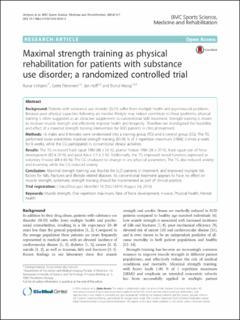| dc.contributor.author | Unhjem, Runar Jakobsen | |
| dc.contributor.author | Flemmen, Grete | |
| dc.contributor.author | Hoff, Jan | |
| dc.contributor.author | Wang, Eivind | |
| dc.date.accessioned | 2020-06-08T06:38:31Z | |
| dc.date.available | 2020-06-08T06:38:31Z | |
| dc.date.created | 2016-12-14T14:37:43Z | |
| dc.date.issued | 2016 | |
| dc.identifier.citation | BMC sports science, medicine and rehabilitation. 2016, 8 (7), . | en_US |
| dc.identifier.issn | 2052-1847 | |
| dc.identifier.uri | https://hdl.handle.net/11250/2657073 | |
| dc.description.abstract | Background:Patients with substance use disorder (SUD) suffer from multiple health and psychosocial problems.Because poor physical capacities following an inactive lifestyle may indeed contribute to these problems, physicaltraining is often suggested as an attractive supplement to conventional SUD treatment. Strength training is shownto increase muscle strength and effectively improve health and longevity. Therefore we investigated the feasibilityand effect of a maximal strength training intervention for SUD patients in clinical treatment.Methods:16 males and 8 females were randomized into a training group (TG) and a control group (CG). The TGperformed lower extremities maximal strength training (85-90 % of 1 repetition maximum (1RM)) 3 times a weekfor 8 weeks, while the CG participated in conventional clinical activities.Results:The TG increased hack squat 1RM (88 ± 54 %), plantar flexion 1RM (26 ± 20 %), hack squat rate of forcedevelopment (82 ± 29 %) and peak force (11 ± 5 %). Additionally, the TG improved neural function, expressed asvoluntary V-wave (88 ± 83 %). The CG displayed no change in any physical parameters. The TG also reduced anxietyand insomnia, while the CG reduced anxiety.Conclusion:Maximal strength training was feasible for SUD patients in treatment, and improved multiple riskfactors for falls, fractures and lifestyle related diseases. As conventional treatment appears to have no effect onmuscle strength, systematic strength training should be implemented as part of clinical practice. | en_US |
| dc.language.iso | eng | en_US |
| dc.publisher | BMC | en_US |
| dc.title | Maximal strength training as a physical rehabilitation for patients with substance use disorder; a randomized controlled trial | en_US |
| dc.type | Peer reviewed | en_US |
| dc.type | Journal article | en_US |
| dc.description.version | publishedVersion | en_US |
| dc.source.pagenumber | 10 | en_US |
| dc.source.volume | 8 | en_US |
| dc.source.journal | BMC sports science, medicine and rehabilitation | en_US |
| dc.source.issue | 7 | en_US |
| dc.identifier.doi | 10.1186/s13102-016-0032-2 | |
| dc.identifier.cristin | 1412787 | |
| dc.description.localcode | C 2016 Unhjem et al.Open AccessThis article is distributed under the terms of the Creative Commons Attribution 4.0 International License (http://creativecommons.org/licenses/by/4.0/), which permits unrestricted use, distribution, andreproduction in any medium, provided you give appropriate credit to the original author(s) and the source, provide a link to the Creative Commons license, and indicate if changes were made. The Creative Commons Public Domain Dedication waiver(http://creativecommons.org/publicdomain/zero/1.0/) applies to the data made available in this article, unless otherwise stated. | en_US |
| cristin.ispublished | true | |
| cristin.fulltext | original | |
| cristin.qualitycode | 1 | |
